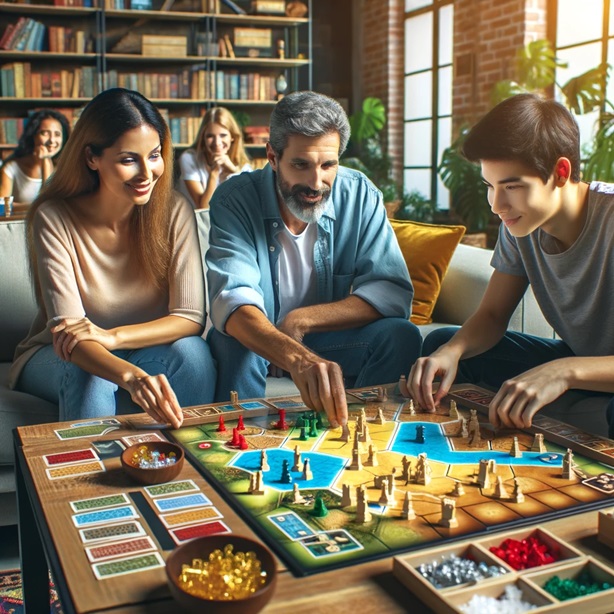The Cognitive Benefits of Board Games
Board games are not only a source of entertainment but also a means of cognitive development. They engage multiple brain areas, including those responsible for memory, spatial reasoning, and strategic planning. Unlike digital games, board games encourage social interaction, which is another key component of cognitive health. Games like chess, Go, and modern strategy games have been shown to improve players' abilities in critical thinking, pattern recognition, and decision-making. Additionally, board games provide a structured environment for learning and practicing new skills, contributing to improved mental flexibility and adaptability.
Playing board games can also enhance cognitive resilience, which is the brain's ability to adapt to challenges and recover from setbacks. The interactive and dynamic nature of board games stimulates cognitive processes and promotes mental acuity, making them a valuable tool for lifelong cognitive enhancement.
Neuroplasticity and Board Games
Neuroplasticity, the brain's ability to form and reorganize synaptic connections, especially in response to learning or experience, is fundamental to cognitive training. Board games often introduce new scenarios and problems to solve, providing a workout for the brain that can improve neuroplasticity. Regular engagement in such games can lead to long-term improvements in cognitive functions. Neuroplasticity is particularly important for maintaining cognitive health as we age, and playing challenging board games can help sustain neural pathways and create new ones, promoting cognitive longevity.
Engaging in complex board games stimulates neural circuits and encourages the development of new connections between brain cells. This neuroplastic adaptation not only improves specific cognitive skills but also enhances overall brain function, contributing to better mental performance and reduced risk of cognitive decline.
Board Games as a Tool for Cognitive Training
Board games can serve as practical tools for cognitive training across various demographics. For children, they promote learning and social skills, enhancing cognitive development and emotional intelligence. In adults, they provide a means to challenge the intellect, relieve stress, and improve mental acuity. For the elderly, board games can be a fun way to keep the mind sharp and prevent cognitive decline, offering mental stimulation and social engagement.
When selecting a board game for cognitive training, consider factors such as the complexity of the game, the level of social interaction required, and the cognitive skills it aims to develop. Games that encourage strategic thinking, memory, and problem-solving are particularly effective for cognitive enhancement. Additionally, choosing games that align with players' interests can enhance engagement and motivation, leading to more effective cognitive training.
Strategic Thinking and Problem-Solving
Many board games require players to develop strategies to win. This process involves problem-solving and planning, which can strengthen the dorsolateral prefrontal cortex, the area of the brain involved in executive function and decision-making. Over time, these mental exercises can improve your ability to think critically and solve problems in real-life situations. Strategic board games, such as Settlers of Catan or Risk, challenge players to anticipate opponents' moves, plan resource management, and adapt to changing game scenarios, all of which enhance cognitive flexibility and analytical thinking.
Strategic thinking exercises stimulate cognitive processes such as evaluation, deduction, and hypothesis testing, which are crucial for effective decision-making. By regularly engaging in these types of board games, you can enhance your executive functions and improve your ability to handle complex and unpredictable situations.
Memory Improvement and Mental Agility
Games that require players to remember specific sequences or sets of items can enhance memory. Such games often involve working memory, which is crucial for following multi-step procedures or directions. Enhancing working memory capacity through board games can lead to improvements in mental agility and an increased ability to process information. Games like Concentration or Memory focus specifically on remembering and matching items, enhancing both visual memory and recall abilities.
Improving memory and mental agility through board games also enhances cognitive reserve, which is the brain's ability to compensate for damage and maintain function. By building a strong cognitive reserve, you can better protect against age-related cognitive decline and improve overall mental performance.
Incorporating Board Games into Daily Life
Incorporating board games into your daily life is simple and can be highly beneficial. Here are some suggestions:
- Set aside time for regular game nights with family or friends: Creating a routine for playing board games provides consistent mental stimulation and fosters social connections.
- Use board games as a pedagogical tool to teach children problem-solving and social interaction skills: Board games offer a fun and engaging way for children to learn important cognitive and social skills.
- Join or create a local board game club to explore a variety of games and meet new people: Participating in a board game club provides opportunities for cognitive training and social engagement, enhancing mental health and well-being.
- Consider solo board games or two-player games for more intimate cognitive challenges: Playing alone or with a partner allows for focused cognitive training and strengthens specific mental skills.
By integrating board games into daily life, you can enjoy the cognitive benefits while also experiencing the social and emotional advantages of this enjoyable activity.
Conclusion
Board games are a valuable and underutilized tool for cognitive enhancement. Their ability to combine strategic thinking, memory, social interaction, and fun makes them an ideal choice for individuals looking to improve their cognitive skills in a holistic manner. By making board games a regular part of your lifestyle, you can enjoy the benefits of a sharper mind, enhanced neuroplasticity, and improved overall mental health. Incorporating board games into your routine offers a proactive approach to cognitive wellness and provides a fulfilling and enjoyable way to maintain cognitive vitality throughout life.
